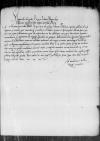In ipso itinere nostro, quod ex Lithuania⌊LithuaniaLithuania⌋ in Poland (Kingdom of Poland, Polonia)⌊PoloniamPoland (Kingdom of Poland, Polonia)⌋ facimus, redditum nobis est responsum ex comitiis, quae Marienburg (Malbork), town and castle in northern Poland, Pomeranian Voivodeship, on the Nogat river, a branch of the Vistula at its delta, the capital of the Grand Masters of the Teutonic Order in Prussia (1309-1457), a voivodeship capital in Royal Prussia, which belonged to the Kingdom of Poland (1466-1772). Marienburg (taking turns with Graudenz (Grudziądz)) was the venue for the Provincial Diets of Royal Prussia, which were chaired by the bishop of Ermland (Warmia)⌊MarienburgiMarienburg (Malbork), town and castle in northern Poland, Pomeranian Voivodeship, on the Nogat river, a branch of the Vistula at its delta, the capital of the Grand Masters of the Teutonic Order in Prussia (1309-1457), a voivodeship capital in Royal Prussia, which belonged to the Kingdom of Poland (1466-1772). Marienburg (taking turns with Graudenz (Grudziądz)) was the venue for the Provincial Diets of Royal Prussia, which were chaired by the bishop of Ermland (Warmia)⌋ a Council of Royal Prussia the most important local authority in Royal Prussia. It consisted of two bishops (of Ermland (Warmia), who served as the Council’s president, and of Kulm (Chełmno)), three voivodes (of Kulm, Marienburg (Malbork), and Pomerania), three castellans (of Kulm, Elbing (Elbląg), and Gdańsk (Danzig)), three chamberlains (of Kulm, Marienburg, and Pomerania), and representatives of the three Great Prussian Cities – Gdańsk, Thorn (Toruń), and Elbing (ACHREMCZYK 2016, p. 17-18)
Royal Prussian Estates ⌊consiliariis et statibus terrarum PrussiaeCouncil of Royal Prussia the most important local authority in Royal Prussia. It consisted of two bishops (of Ermland (Warmia), who served as the Council’s president, and of Kulm (Chełmno)), three voivodes (of Kulm, Marienburg (Malbork), and Pomerania), three castellans (of Kulm, Elbing (Elbląg), and Gdańsk (Danzig)), three chamberlains (of Kulm, Marienburg, and Pomerania), and representatives of the three Great Prussian Cities – Gdańsk, Thorn (Toruń), and Elbing (ACHREMCZYK 2016, p. 17-18)
Royal Prussian Estates ⌋ proxime celebrata sunt, et quoniam cum propter festinationem, quam ad conficiendum iter hoc adhibemus, tum propter huius itineris summam incommoditatem in cogitationem de responso descendere non potuimus, deliberationem hanc Cracow (Kraków, Cracovia), city in southern Poland, Małopolska, on the Vistula river, from 1038 capital of the Kingdom of Poland⌊CracoviamCracow (Kraków, Cracovia), city in southern Poland, Małopolska, on the Vistula river, from 1038 capital of the Kingdom of Poland⌋ usque reiciendam censuimus, ubi deliberatione maturiore adhibita auctoritate nostra, ea, quae in Provincial Diet of Royal Prussia ⌊comitiisProvincial Diet of Royal Prussia ⌋ Marienburgensibus decreta ex re publica intelligemus, comprobabimus. Et quoniam contributio etiam in eis Provincial Diet of Royal Prussia ⌊comitiisProvincial Diet of Royal Prussia ⌋ statuta est, quae sine mandatis nostris exigi non potest, mandabimus Cracow (Kraków, Cracovia), city in southern Poland, Małopolska, on the Vistula river, from 1038 capital of the Kingdom of Poland⌊CracoviaeCracow (Kraków, Cracovia), city in southern Poland, Małopolska, on the Vistula river, from 1038 capital of the Kingdom of Poland⌋ confici et conscribi mandata. Verum interim Paternitatis Tuae erit cancellariam nostram instructam reddere nomenclaturis eorum, ad quos istic litteras mandatorum dari censebit, quosque exactores deligendos putabit.
Bene valeat Paternitas Vestra.


 BCz, 1601, p. 364
BCz, 1601, p. 364